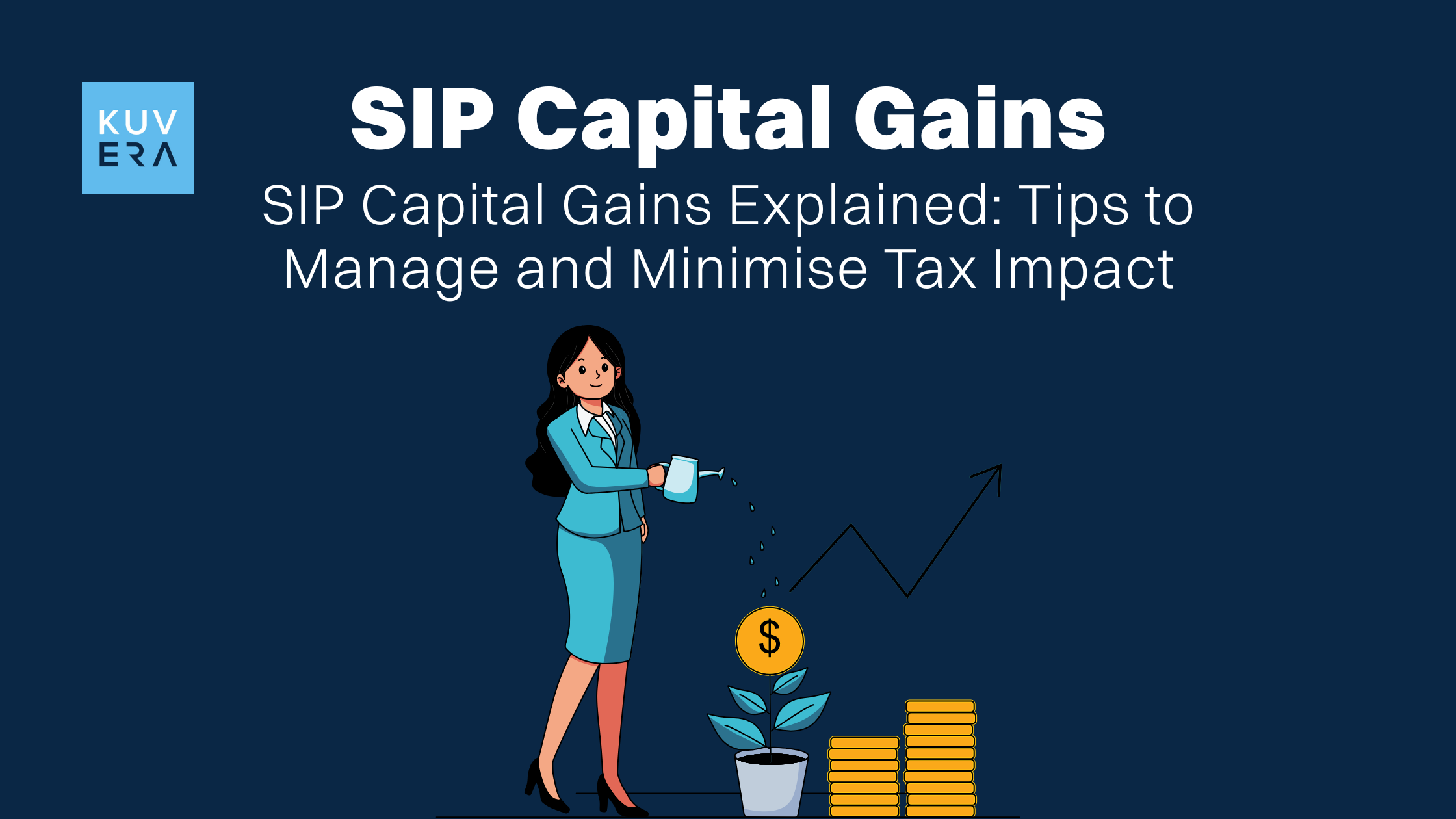Systematic Investment Plans (SIPS) have transformed the way many individuals approach wealth creation, offering a disciplined and effective method to invest in mutual funds. While sips simplife the investment process, undertanding the tax implications on the Gains generated is Crucial for Maximizing your net returns. When you redeem your mutual fund units, any duty earned is Subject to Capital Gains Tax.
In this blog we will demystify sip capital gains tax, explain the differentcs between short term capital gains tax and long term capital gain, and provide pravide pravide and provide pravide to management and provider your tax Liability As a sip investment.
Undrstanding Capital Gains on Sip Investments
A Capital Gain Arises when you sell your mutual funds at a price higher than your purchase price. For Sip Investments, Each installment is treated as a fresh purchase of units. This means that when you redeem your units, the holding period for Each individual installment determines whether the Gain is short-term or long-term.
Look at the table below:
| Fund Type | Short-Term Capital Gains Holding Period | Long-term capital gains holding period |
|---|---|---|
| Equity funds | Shorter than 12 months | 12 months and longer |
| Hybrid equity-oriented funds | Shorter than 12 months | 12 months and longer |
| Debt Funds (Post-March 31, 2023) | Always Short-Term | N/a |
| Debt Funds (Pre-PRIL 1, 2023) | Shorter than 36 months | 36 months and longer |
| Other Hybrid Funds | Shorter than 36 months | 36 months and longer |
The taxation of these gains primarily depends on two main factors:
1. Type of Mutual Fund
Whether the fund is equity-oriented or debt-oriented.
- Equity-oriented Mutual Funds Typically Invest at Least 65% of their assets in Indian rights.
- Debt-oriented Mutual Funds Invest PredeMinantly in Fixed-Income Securities Like Bonds, Government Securities, and Money Market Instruments.
2. Holding Period
The Duration for which you help the units before redemption.
Short-Term Capital Gains (STCG) Tax
Short Term Capital Gains Tax Applies when you sell your mutual fund units before a specified holding period. The tax rates and holding periods can difficult for equity and debt funds:
1. for equity-oriented mutual funds
If you redeem units from an equity-oriented fund with 12 months from their purchase date, any profit is considered a short-term capital gain. This short term capital gains tax is currently levied at a flat rate of 15%. For example, if you made a profit of ₹ 10,000 from Units Redeemed Within 12 months, you would pay ₹ 1,500 as tax.
2. For debt-oriented mutual funds (purchased on or after April 1, 2023)
For debt funds purchased on or after April 1, 2023, All Gains, Regardless of the Holding Period, are treated as short term capital gains tax. These Gains are added to your total income and taxed according to your applicable income tax slab rate. No indexation benefits applies here.
3. For Debt-Oriented Mutual Funds (Purchased Before April 1, 2023)
If you help these units for 36 months or less, the Gains are classified as short-term and are added to your income, taxed as per your individual income tax slab rate.
Long-term capital gain (ltcg) tax
Long Term Capital Gain Applies when you hold your mutual fund units beyond the Specified Short-Term Holding Period. The taxation rules for long term capital gain also based on the fund type:
1. for equity-oriented mutual funds
If you redeem units from an equity-oriented fund after holding them for more than 12 months, the profit is consulted a long term capital gain. These Gains are taxed at a rate of 10% on Gains Exceding ₹ 1 Lakh in a Financial Year. The first ₹ 1 Lakh of Long Term Capital Gain from Equity-Oriented Funds in a Financial Year is Exempt from Tax. For instance, if you realized a long term capital gain of ₹ 150,000 from your Equity Fund in a Financial Year, The tax would be left only on ₹ 50,000 (₹ 150,000 – 100,000 – 100,000 EXMPTION) ₹ 5,000 (10% of ₹ 50,000).
2. For debt-oriented mutual funds (purchased on or after April 1, 2023)
As mentioned, gains from these funds are always treated as short-term and taxed at slab rates, irrespective of the holding period. There is no long term capital gain tax rate for these investments.
3. For Debt-Oriented Mutual Funds (Purchased Before April 1, 2023)
If you help these units for more than 36 months, the Gains are classified as long term capital gains. These are taxed at 20% with indexation benefits. Indexation adjusts the purchase cost for inflation, thereby reduction the taxable gain. This mechanism aims to tax only the real gains, not the inflation-edjusted gains.
How to Calculate Capital Gains on SIP Redemptions
Calculating Capital Gains for Sips Can Be Slightly Complex Secause Each Installment has its own purchase date and thus, its Holding Period. When you redeem units from a sip, the “first-in, first-out” (FIFO) method is generally applied. This means the units purchased earliest are considered to be sold first for taxation purposes.
Here are the steps to calculate this:
Step 1: Identify Each Installment
Keep a record of each sip installment’s date and the net asset value (Nav) at which units was purchased.
Step 2: Determine Units Sold
Note the number of units you redeeming and the Nav on the redemption date.
Step 3: Apply Fifo
Identify which Specific SIP Installments Correspond to the units being solders, starting from the oldest.
Step 4: Calculate Gain Per Installment
For Each Installment’s Units Sold, Calculate the Profit (Redemption Nav – Purchase Nav For that Installment).
Step 5: Determine Holding Period
For Each Installment’s Units, Calculate the Holding Period from its purchase date to the redemption date.
Step 6: Apply Relevant Tax Rate
Based on the fund type and holding period for each installment, apply the appliance short term capital gains tax or long term capital gain tax rate.
Tips to manage and minimise your tax impact
While Paying Taxes is Inevitable, Intelligent Planning Can Help You Optimise Your Tax Outflow on Sip Capital Gains:
1. Prioritise long-term investment in equity funds
HOLDING Equity Mutual Fund Units for more than 12 months automatically Qualifies them for the More Favorable Long Term Capital Gain Tax Rate (10% on Gains Above ₹ 1 Lakh) The short term capital gains tax of 15%. This strategy is often the most effective tax-saving method.
2. Utilize the annual ltcg exemption (tax harvesting)
You can sell equity mutual fund units that have generated a long term capital gain of up to ₹ 1 lakh in a financial year and immediatively reinvest the procedures. Since ltcg up to ₹ 1 Lakh is exempt, you pay no tax on this gain. By Doing this annual, especially towards the end of the financial year (eg, in March), you can utilize the ₹ 1 lakh exemption Each year, effectively Reducing your Overall TAX LABILITY FULLLL Redemption. This strategy is knowledge as tax harvesting.
3. Stagger your redemptions
I instead of redeeming a large lump sum at once, consider staggering your withdrawals across multiple financial years. This can help you utilize the ₹ 1 Lakh Ltcg Examption on Equity Funds in Each of Theose Years, Minimising Your Overall Capital Gains TAX.
4. Systematic Withdrawal Plans (SWPS)
If you needed regular income from your investments post-surroundments or for any other planned expenses, a systematic withdrawal plan (Swp) can be tax-efficient. By withdrawing a fixed amount periodically, you can manage the capital gains generated in each withdrawal and potentially keep them with the tax-exmpt limits or loger tax brockets, especial Units have been hand for the long term.
5. Tax-Loss Harvesting
If you have some some mutual fund investments that are currently showing a loss, you can sell them to book a capital loss. This loss can then be set off against any capital gains tax you may have from other investments in the same financial year. Short-Term Capital Losses Can Be Set Off Against Bot Short-Term and Long-Term Capital Gains, What long-term capital losses can only be set off against Long-Term Capital Gains. Unuiled losses can be carried forward for up to 8 subsequent assessment years.
6. Undrstand Debt Fund Taxation Changes
Be acutely aware that for debt mutual funds purchased on or after April 1, 2023, All Gains are Taxed at your Income Slab Rates, Irrespective of Holding Period. This significantly changes their tax efficiency compared to older debt fund investments that benefited from long term Capital Gain Tax Rate with indexation.
7. Consult a Financial Advisor
Taxation can be complex, and individual financial situations vary. Consulting a Qualified Financial Advisor or Tax Expert Can Provide Personalized Strategies Tailored to your Specific Investment Portfolio and Tax SITUATION.
Wrapping up
SIP Investments Offer a Powerful Path to Wealth Creation, But Managing The Associated Capital Gains Tax is an Integral Part of Optimising Your Returns. You can effectively manage and minimise your tax impact with informed. A proactive and informed approach to taxation will ensure that your disciplined sip efforts yield the best possible after-tax returns.
Interested in how we think about the markets?
Read More: Zen and the art of investment
Watch here: Learn about the F & O Craze in India



